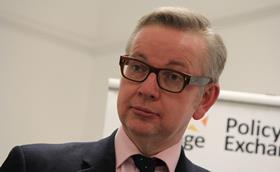
Growers and farmers will have to “earn” post-Brexit subsidies by protecting the environment and developing rural life, environment minister Michael Gove will say today.
In a wide-ranging speech due to take place later today at the WWF’s Living Planet Centre, Gove is due to say the move is part of his vision for a “green Brexit”.
Gove will also confirm that the government will match the current EU funding of £3 billion for British farming after Brexit. “I want to ensure we go on generously supporting farmers for many more years to come,” he will say. “But that support can only be argued for against other competing public goods if the environmental benefits of that spending are clear.”
With a strong focus on the environment that is somewhat at odds with his record of voting against measures to prevent climate change, Gove also praised lobbying organisations such as Greenpeace, Friends of the Earth and the WWF.
“Their campaigning energy and idealism, while occasionally uncomfortable for those of us in power, who have to live in a world of compromise and deal-making, is vital to ensuring we continue to make progress in protecting and enhancing our environment,” he said.
“We now have an historic opportunity to review our policies on agriculture, land use, biodiversity, woodlands, marine conservation, fisheries, pesticide licensing, chemical regulation, animal welfare, habitat management, waste, water purity, air quality and so much more.”
Speaking about the Common Agricultural Policy (CAP), Gove said the system “all too often puts resources in the hands of the already wealthy rather than into the common good of our shared natural environment”, and he said current EU farming approaches are “degrading our soil”.
“Whether environmental campaigner or farmer, we can all agree such a trajectory is, literally, unsustainable. Which is why we need to take the opportunity that being outside the Common Agricultural Policy will give us to use public money to reward environmentally-responsible land use,” he said.
Gove has already been more visible than his predecessor Andrea Leadsom with appearances at the Great Yorkshire Show, a hustings by think tank Green Alliance and in the mainstream press.
But some food commentators have rejected Gove’s apparently new-found passion for food and and farming. In a blog published on his website, food writer Jay Rayner refused an invite to attend a Defra roundtable on food policy, offering advice instead in writing.
He said: “The importance of food price rises around the world should not be understated. Many may find this unpalatable but the fact is this: unless we improve our self-sufficiency, we will be at the complete mercies of those international markets.
“Unless we pay a little more now, we risk paying vastly more later. This is an argument that farmers, retailers and the Government needs to engage with.'
According to Rayner, a new British agriculture policy should include encouragement away from monocultures and into diverse agricultural activity, with subsidies paid on environmental protection that has worked, not just installed.



